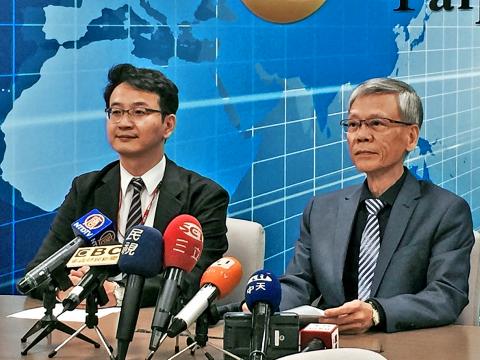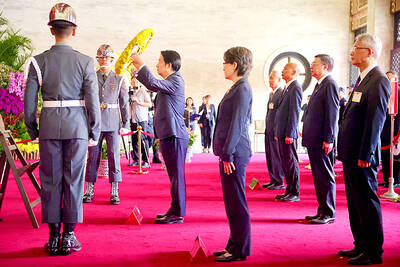Semiconductor inspection tool and equipment maker Hermes Microvision Inc (HMI, 漢微科) yesterday said it has accepted a NT$100 billion (US$3.09 billion) buyout offer from ASML Holding NV, as the two companies aim to jointly develop advanced inspection technologies for smaller chips.
“The combination of the two companies will better help customers overcome difficulties in chip-shrinking process technologies and help them improve their yields,” Hermes Microvision chairman Shu Chin-yung (許金榮) told a media briefing before the stock market opened yesterday.
Shares of Hermes Microvision surged 9.92 percent to close at NT$1,330 yesterday on the over-the-counter Taipei Exchange.

Photo: Hung Yu-fang, Taipei Times
According to the agreement, Netherlands-based ASML is to pay NT$1,410 for each Hermes Microvision share. That represents a 16.63 percent premium to Wednesday’s closing price of NT$1,210, or 31 percent to the company’s average share price over the past 30 days.
The transaction marks the second-largest acquisition in the nation this year, following US memorychip maker Micron Technology Inc’s NT$130 billion buyout offer for the remaining 67 percent stake in Inotera Memories Inc (華亞科技).
Hermes Microvision, which has an 85 percent share of the global e-beam inspection market, counts the world’s two biggest semiconductor equipment spenders — Intel Corp and Taiwan Semiconductor Manufacturing Co (台積電) — as its clients.
“The acquisition is intended to make a strong product offering even stronger. Our metrology technologies are complementary and, when combined, they would offer the chance to significantly improve process control and enhance yields for our customers,” ASML president and chief executive officer Peter Wennink said in a joint statement.
The integrated offerings are to address the challenges chipmakers are facing as they enter sub-10 nanometer dimensions and 3D integration, requiring chip manufacturers to apply advanced process control, the statement said.
As the e-beam inspection systems are specially designed for mask manufacturers to identify defects in extreme ultraviolet (EUV) masks, the acquisition of Hermes Microvision would support ASML’s EUV platform, which is to be used for volume production of semiconductors starting in 2018, the statement said.
As part of the deal, Hermes-Epitek Corp (漢民科技), the parent of Hermes Microvision, and certain ranking executives agreed to subscribe to a total of 5.9 million ASML shares at NT$3,106 per share.
HMI founder and CEO Jack Jau (招允佳) said the company intends to continue to invest in and grow its business at its two operation sites in Taiwan, where it employs about 350 people.
After the transaction is finalized in the fourth quarter, Hermes Microvision is to become a fully owned subsidiary of ASML and is to delist its shares from the over-the-counter market.
Yuanta Securities Investment Consulting Co (元大投顧) analyst Steve Huang (黃柏璁) said the deal would help Hermes Microvision accelerate its upgrading process and boost the company’s slow e-beam business.
The company would also obtain research and development resources from ASML to expand its e-beam business, while fending off growing competition from bigger rivals, such as Applied Materials Inc and Lam Research Corp, Huang said in a note yesterday.
As HMI and ASML only have a combined market share of about 15 percent, there should be no anti-trust concern, Huang said.

RESPONSE: The transit sends a message that China’s alignment with other countries would not deter the West from defending freedom of navigation, an academic said Canadian frigate the Ville de Quebec and Australian guided-missile destroyer the Brisbane transited the Taiwan Strait yesterday morning, the first time the two nations have conducted a joint freedom of navigation operation. The Canadian and Australian militaries did not immediately respond to requests for comment. The Ministry of National Defense declined to confirm the passage, saying only that Taiwan’s armed forces had deployed surveillance and reconnaissance assets, along with warships and combat aircraft, to safeguard security across the Strait. The two vessels were observed transiting northward along the eastern side of the Taiwan Strait’s median line, with Japan being their most likely destination,

‘NOT ALONE’: A Taiwan Strait war would disrupt global trade routes, and could spark a worldwide crisis, so a powerful US presence is needed as a deterrence, a US senator said US Senator Deb Fischer on Thursday urged her colleagues in the US Congress to deepen Washington’s cooperation with Taiwan and other Indo-Pacific partners to contain the global security threat from China. Fischer and other lawmakers recently returned from an official trip to the Indo-Pacific region, where they toured US military bases in Hawaii and Guam, and visited leaders, including President William Lai (賴清德). The trip underscored the reality that the world is undergoing turmoil, and maintaining a free and open Indo-Pacific region is crucial to the security interests of the US and its partners, she said. Her visit to Taiwan demonstrated ways the

GLOBAL ISSUE: If China annexes Taiwan, ‘it will not stop its expansion there, as it only becomes stronger and has more force to expand further,’ the president said China’s military and diplomatic expansion is not a sole issue for Taiwan, but one that risks world peace, President William Lai (賴清德) said yesterday, adding that Taiwan would stand with the alliance of democratic countries to preserve peace through deterrence. Lai made the remark in an exclusive interview with the Chinese-language Liberty Times (sister paper of the Taipei Times). “China is strategically pushing forward to change the international order,” Lai said, adding that China established the Asia Infrastructure Investment Bank, launched the Belt and Road Initiative, and pushed for yuan internationalization, because it wants to replace the democratic rules-based international

WAR’S END ANNIVERSARY: ‘Taiwan does not believe in commemorating peace by holding guns,’ the president said on social media after attending a morning ceremony Countries should uphold peace, and promote freedom and democracy, President William Lai (賴清德) said yesterday as Taiwan marked 80 years since the end of World War II and the Second Sino-Japanese War. Lai, Vice President Hsiao Bi-khim (蕭美琴) and other top officials in the morning attended a ceremony at the National Revolutionary Martyrs’ Shrine in Taipei’s Zhongshan District (中山) to honor those who sacrificed their lives in major battles. “Taiwanese are peace-loving. Taiwan does not believe in commemorating peace by holding guns,” Lai wrote on Facebook afterward, apparently to highlight the contrast with the military parade in Beijing marking the same anniversary. “We